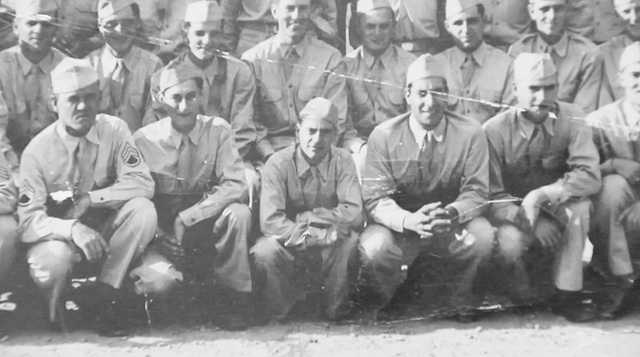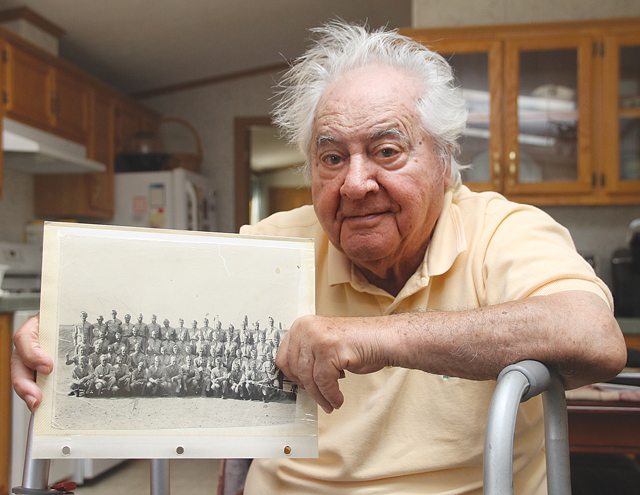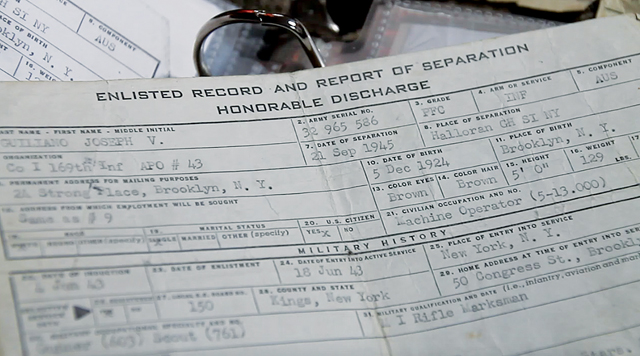VJ Day Anniversary: Local vet shares how he earned the Purple Heart

Directly across from the front door inside Joseph Guiliano’s Riverhead home, hanging at eye level in a glass keepsake is his Purple Heart.
A general presented him with the medal while he lay was lying in a hospital bed with shrapnel wounds in his shoulder, back and head after being shelled in the Philippines during the Battle of Luzon in January 1945.
“They asked you if you wanted a parade or something like that, if you wanted something better,” said Mr. Guiliano, 90. “I told him, ‘No, no; give me the Purple Heart.’ ”
Seventy years after V-J Day, the official end of World War II, Mr. Guiliano hasn’t lost that modesty.
His war experience began in 1943, when he was drafted into the United States Army at 18 years old. Having lived in an orphanage for most of his life, the Brooklyn native wasn’t bothered by being away from the U.S.
“There were a lot of people there that were drafted, that were crying, but I didn’t do that,” he said. “I had no problem with that. I was always away from home.”
He barely met the five-foot height requirement, making him the smallest guy in his unit. This earned him the nickname “Shorty” among his friends. It also forced him to prove he was just as good a soldier as his bigger peers.
Mr. Guiliano traveled from New York to South Carolina, where he spent three months in basic training. Most of his unit was sent to Germany, but Mr. Guiliano was sent to Fort Meade, Md., for transfer to the Pacific Theater.

He spent 43 days on a merchant marine ship, passing through in the Panama Canal en route to New Caledonia, a French island in the South Pacific. He and the rest of his squad were to be replacements for casualties already sustained. This meant Mr. Guiliano joined an existing unit, the 169th Infantry Regiment. In total, over 400,000 Americans would die during World War II.
He traveled to New Guinea and New Zealand, where the unit picked up more replacement troops. He didn’t fight on those islands, having missed active combat, and served mostly during a period of rest and roster building.

Although he personally didn’t fight during this time, Mr. Guiliano still saw a fair share of violence.
“We were out in the water, the South Pacific, quite a bit. Every day you look out on a ship and you see our Navy,” he said, pausing as the memory brought back emotions. “Then you would see attacks. The enemy was attacking the ships. Lucky we didn’t get hit.”
Mr. Guiliano did see combat in the Philippines on Jan. 9, 1945, as part of the invasion force during the Battle of Luzon.
Time magazine reported at the time that “Luzon was the objective. Every move by General MacArthur’s forces pointed toward the main, northernmost island of the Philippines.”
Related: Southold Town’s World War II vets share their war stories.
During the battle, Mr. Guiliano committed what he calls his “biggest mistake”: bringing a box of hand grenades into a trench with him. In the trench, which was full of other American soldiers, he accidentally dropped a grenade.
“Nonchalantly, I just picked it up and threw it and it went off. I saw the smoke, I felt it; it was pretty close,” he said. “Then I started thinking what would happen and this and that. We should have never taken that box of grenades in there.”
On Jan. 20, 1945, 11 days after the start of the battle, Mr. Guiliano was wounded as the Army pushed its way into the hills closer to the town of Baguio.
“Shells came in, I don’t know if they were our shells or … everybody was blasting away,” he said. “I felt myself go up in the air. I felt myself go off the ground.”
He immediately checked his arm to make sure his rifle was still there. It was. Having been hit in the shoulder, back and head, he placed the rifle over his shoulder. He said he might have continued fighting, but another soldier noticed his wounds and ordered him to get help.
Mr. Guiliano trekked back down the hill, shouting for a medic the entire time.
He made it back to base and was placed on a hospital ship.

On the ship, doctors discovered gas gangrene had set in. He was taken back to New Guinea for surgery, then boarded another hospital ship to Seattle, Wash. After bouncing from hospital to hospital, he finally returned to New York and, due to his injuries, was honorably discharged from the service. Years later, he would learn that shrapnel had also embedded itself in his leg.
Mr. Guiliano was in his home town when news broke that the war was over.
“Oh boy, we celebrated,” he said, smiling at the memory.


